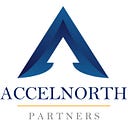3 insights from advising a Series A fundraise: understand your market, valuation is a creative art, and limit fundraising windows
Our Associate Siddharth Choksi shares his insights about helping a B2B SaaS business prepare for their Series A fundraise.
I spent the last few years on the investor’s side of the table having worked at a few early-stage venture funds (Samaipata Ventures in Madrid and ASIF Ventures in Amsterdam).Since joining AccelNorthPartners, I spent my time working alongside the management team of a European startup that is currently in the midst of raising their Series A round of funding. Here are some my key points of reflection:
The importance of knowing the intricacies of your market
It may sound obvious and intuitive but having spent some time with the founders, it really struck me just how much time and energy they invest in identifying and understanding their target market as well as being on top of industry developments; from competitors launching new products or raising fresh funds to regulators introducing new or amending existing policies pertinent to their vertical. While investors often concentrate (too much) on the latter, the former is significantly more important as businesses ought to be competition aware, but customer obsessed.
Clearly, early-stage companies (i.e., those that are still in search to reach product/market fit, typically pre-Series A) lack the quantitative data to be fully certain that they are on the right path. Thus, in light of the number of unknowns and the heavy reliance on assumptions and instinct, it becomes all the more important to pay close attention to your target audience as consumer behavior and expectation constantly change.
This is made substantially harder when you are attempting to create a new market (like how Uber pioneered ride-hailing or Airbnb pioneered home sharing) as there are nearly no reliable benchmarks to base your trajectory on.
Data needs to be turned into actionable insights in order to be useful. However, one can nearly always find alternative data to convincingly support the other side of a particular argument. Thus, in the context of startup fundraising, founders can’t merely rely on external metrics, figures and statistics, instead, the most convincing factor that founders can possess is their conviction. Conveying your passion for solving an important problem in the world, irrespective of how complicated or arbitrary, is undoubtedly one of the most important variables for an investor to consider when investing in an early-stage company.
Valuation is an art, not a science
Prior to joining AccelNorthPartners, I have been involved in about half a dozen investment negotiations, all of which were from the investor’s side of the table. The crux of all these deals is always the valuation talk.
VCs have a significant information advantage that allow them to rely on a fair amount of pattern recognition to justify a particular valuation, whereas founders don’t have those insights to benchmark on.
It’s therefore important as a founder to control the narrative when fundraising. This means being good at storytelling and conveying your views as convincingly as possible. As an investor, the work behind building up that narrative is rarely seen, so it was really interesting to see how we supported the founder to discover her unique narrative.
What quickly became clear was that it’s really important for founders to have a close circle of people to spar with prior to engaging in any formal conversations with new investors, simply to validate their line of reasoning. An added benefit is the (often needed) confidence boost.
There are no specific formulas or calculations one can do to come with an exact valuation as it all simply boils down to investors’ willingness to pay. In light of that, a lot of said value is weighed on the person(s) running and operating the business, making first impressions is all the more important.
Focus on the business and limit fundraising to disciplined windows
The vast majority of VCs spend most of their time scouting for potential investment opportunities. Therefore, if you are a startup and you have a compelling business (and have a somewhat decent web presence) you will be seen by potential investors.
As an investor, unless already invested in the company, you rarely get a glimpse at just how much other investor’s interest you are up against to participate in a particular round. Now, simply having investor interest is by no means any certainty for converting them into offers, but it does show that founders shouldn’t necessarily be spending too much time trying to get onto the radar of investors in their early days, instead focus on operations to show traction and product market fit and cross that bridge once you get there.
It was interesting to see that our client refrained from engaging with the interested investors in any meaningful way up until the business was ready to take on a next round of funding. In turn preserving maximum investor interest at time of need.
All in all, perspective is everything
While VCs and founders are aligned on the majority of things, there remains a difference of perspective (and to an extent, a difference in incentives). I look forward to helping more founders in navigating their journeys and finding their narrative. All startups are created different and thus no two journeys will look alike, but that’s what makes this space so exciting.
Photo Credit: Anna Shvets and Karolina Grabowska from Pexels
